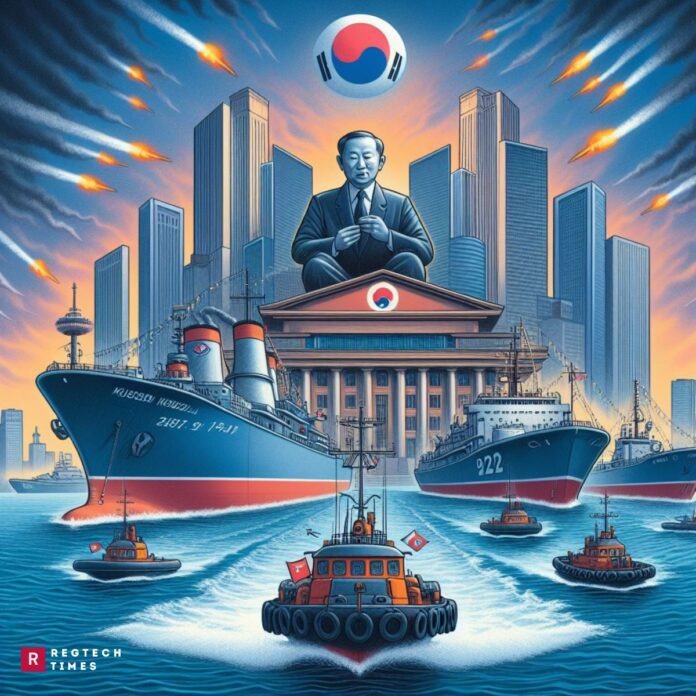On Friday, South Korea took a decisive step in its ongoing struggle against North Korea’s nuclear ambitions by imposing sanctions on seven North Korean individuals and two Russian vessels. This move, aimed at curtailing illegal weapons trade and other activities that violate United Nations Security Council (UNSC) resolutions, marks a significant escalation in regional tensions.
Background of the Sanctions
The sanctioned individuals and vessels are accused of engaging in activities that support North Korea’s nuclear and missile programs. According to the South Korean foreign ministry, these actions include transporting military supplies and facilitating arms negotiations between Pyongyang and Moscow. The Russian vessels in question were reportedly caught ferrying large quantities of containers loaded with military supplies between Russia and North Korea.
These sanctions come amid heightened accusations from the United States and South Korea, alleging that North Korea has been supplying weapons to Russia for its ongoing war in Ukraine. Both Moscow and Pyongyang have denied these claims, although they have publicly vowed to strengthen military ties.
You may also like to read the book on Sanctions
Details of the Individuals and Russian Vessels
The South Korean foreign ministry’s statement provided detailed allegations against the sanctioned parties. One North Korean individual, representing a state-controlled company based in Syria, allegedly negotiated arms deals with a Russian operative from the Wagner Group between 2022 and 2023. This information was corroborated by an annual report from the U.N. panel of experts monitoring North Korea’s activities.
The two Russian vessels comprise MAIA-1 and MARIA that are suspected of transporting containers loaded with military supplies to and from North Korea and Russia.
Stateless Cargo Ship De Yi Detained: South Korea’s Bold Move Against North Korea
International Reactions
Russia has condemned these new sanctions, promising retaliatory measures. The Russian Foreign Ministry criticized South Korea’s sanctions, labeling them as an unjust move that destabilizes the region. This stance was echoed by North Korea, which has consistently rejected any accusations of weapons transfers to Russia.
Impact on Regional Security
South Korea’s imposition of sanctions is a direct response to what it perceives as ongoing threats to peace and security on the Korean Peninsula. Seoul argues that North Korea’s relentless pursuit of nuclear and missile capabilities is the primary destabilizing factor in the region. This perspective was reiterated following recent comments by Russia’s top diplomat, who had criticized joint military exercises conducted by South Korea, the United States, and Japan as sources of regional instability.
The new sanctions reflect a broader strategy by South Korea and its allies to apply pressure on Pyongyang through international cooperation and enforcement of UNSC resolutions. These measures are designed to cut off critical supply lines that support North Korea’s military developments.
South Korea’s Sanctions Against Russia: A Bold Step Against North Korea
Broader Implications
The imposition of these sanctions highlights the complex interplay of geopolitical interests in Northeast Asia. South Korea’s actions are not merely a response to immediate threats but also part of a larger effort to uphold international norms against the proliferation of weapons of mass destruction. By targeting individuals and entities involved in illicit arms trade, Seoul aims to disrupt the networks that enable North Korea’s defiance of global security measures.
In the broader context, these sanctions also underscore the strained relations between Russia and the West, exacerbated by the conflict in Ukraine. The involvement of Russian vessels in supporting North Korea’s military activities further complicates the already volatile situation, prompting a stern response from South Korea and its allies.
As tensions continue to rise on the Korean Peninsula, South Korea’s latest sanctions on North Korean individuals and Russian vessels mark a significant development in the international effort to curb North Korea’s nuclear ambitions. While the immediate impact of these sanctions remains to be seen, they send a clear message about the consequences of violating UNSC resolutions and the determination of South Korea and its allies to enforce international law. The evolving situation demands close monitoring as geopolitical dynamics in the region continue to shift.


